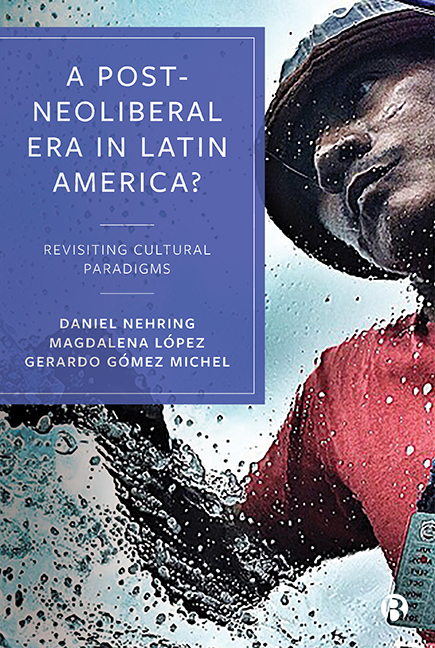Book contents
- Frontmatter
- Contents
- List of Tables and Figures
- Notes on Contributors
- 1 Introduction: Everyday Life in (Post-)Neoliberal Latin America
- 2 Imaginaries, Sociability and Cultural Patterns in the Post-Neoliberal Era: A Glance at the Argentinean, Paraguayan, and Venezuelan Experiences
- 3 Making Neoliberal Selves: Popular Psychology in Contemporary Mexico
- 4 From Uribe’s “Democratic Security” to Santo’s Peace Accords with the FARC: Hate, Fear, Hope and other Emotions in Contemporary Colombian Politics
- 5 Cine Bajo Tierra: Ecuador’s Booming Underground Cinema in the Aftermath of the Neoliberal Era
- 6 Neoliberalising Humanity: Culture and Popular Participation in the Case of the Street Market of Caruaru, Brazil
- 7 The Contribution of the Catholic Magazine Espacio Laical and the Constitution to the Cuban Public Sphere
- 8 Argentina: The Philosophical Resistance to the Conquest of the Soul1
- 9 Fleeing (Post-)Chávez Memories: The 1990s and the Black Friday Generation
- 10 Re-imagined Community: The Mapuche Nation in Neoliberal Chile
- 11 Neoliberalism and the Negotiation of the American Dream in Contemporary Latina Narratives
- 12 Bare Life in Contemporary Mexico: Everyday Violence and Folk Saints
- Index
10 - Re-imagined Community: The Mapuche Nation in Neoliberal Chile
Published online by Cambridge University Press: 20 April 2022
- Frontmatter
- Contents
- List of Tables and Figures
- Notes on Contributors
- 1 Introduction: Everyday Life in (Post-)Neoliberal Latin America
- 2 Imaginaries, Sociability and Cultural Patterns in the Post-Neoliberal Era: A Glance at the Argentinean, Paraguayan, and Venezuelan Experiences
- 3 Making Neoliberal Selves: Popular Psychology in Contemporary Mexico
- 4 From Uribe’s “Democratic Security” to Santo’s Peace Accords with the FARC: Hate, Fear, Hope and other Emotions in Contemporary Colombian Politics
- 5 Cine Bajo Tierra: Ecuador’s Booming Underground Cinema in the Aftermath of the Neoliberal Era
- 6 Neoliberalising Humanity: Culture and Popular Participation in the Case of the Street Market of Caruaru, Brazil
- 7 The Contribution of the Catholic Magazine Espacio Laical and the Constitution to the Cuban Public Sphere
- 8 Argentina: The Philosophical Resistance to the Conquest of the Soul1
- 9 Fleeing (Post-)Chávez Memories: The 1990s and the Black Friday Generation
- 10 Re-imagined Community: The Mapuche Nation in Neoliberal Chile
- 11 Neoliberalism and the Negotiation of the American Dream in Contemporary Latina Narratives
- 12 Bare Life in Contemporary Mexico: Everyday Violence and Folk Saints
- Index
Summary
Introduction
Academic discussion has profoundly reviewed the effects of neoliberalism in Latin American countries, defined its origins and metropolitan directives, and even celebrated the programmatic responses that in some countries such as Venezuela and Bolivia have allowed a glimpse of interrupted neoliberalism—not without facing serious problems such as the severe crisis of post-Chavism and the conflicts of Evo Morales regime with some indigenous peoples and its recent setback in recent elections. Revising the case of the long and uninterrupted conflict between the Mapuche people and the Chilean state allows us to see in its extreme rawness the current struggle between global capitalism and the indigenous communities harmed by this system. Chile is not only an example of the strict implementation of the neoliberal model in the 1970s—the first major practical experiment of what would be called the Washington Consensus in the 1990s, which all Latin American countries (except for Cuba) signed to escape, under the guidelines of the IMF and the World Bank, from the decade of economic stagnation caused by the debt crisis in the 1980s. It is also an example in Latin America where a neoliberal state frontal attack on an indigenous people was perhaps forceful, focused, and effective: the so-called agrarian counter-reform of the Pinochet regime of 1974 and Law 2,568 of 1979, which repealed the continuity of land title deeds (Títulos de Merced). Even when the fall of the dictatorship and the return to democracy in Chile could open a scenario of hope for the Mapuche community, the reality has proved them wrong. Despite the opening of intercultural policies and improvements in the institutionalization of indigenous rights (with the enactment of Law 19,253 and the consequent creation of the National Indigenous Development Corporation (CONADI) in 1993) when faced with the protests and demands of the Mapuche people—particularly in regards to the recovery of ancestral territories—the state response continues to be that of the neoliberal model of imprisonment and violent repression.
- Type
- Chapter
- Information
- A Post-Neoliberal Era in Latin America?Revisiting Cultural Paradigms, pp. 195 - 220Publisher: Bristol University PressPrint publication year: 2019



